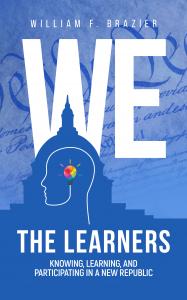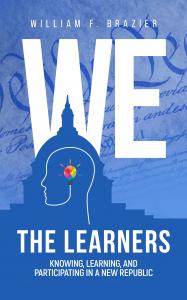WE, THE LEARNERS: Knowing, Learning, and Participating in a New Republic by William F. Brazier
FAIRFAX COUNTY, VA, UNITED STATES, October 27, 2025 /EINPresswire.com/ — As civic unrest and political polarization continue to dominate public discourse, philosopher and educator William F. Brazier issues a bold and timely challenge in his new book, WE, THE LEARNERS: Knowing, Learning, and Participating in a New Republic. With intellectual clarity and moral urgency, Brazier calls on readers to reconsider the very foundations of human society and to imagine a future organized around our most defining human quality: the capacity to learn.
Across the United States — and throughout the world — many people are experiencing 21st-century civic anxiety, a growing sense of unease about the direction of democracy, community and truth itself. WE, THE LEARNERS responds to that anxiety with both philosophical depth and practical vision.
The book begins by tracing how humans have come to understand knowledge, revisiting the ideas of thinkers such as Socrates, Locke, Kant and Nietzsche to illuminate the evolution of human thought and the enduring question of how we know what we know.
From this philosophical foundation, Brazier turns to the urgent question of civic organization. He argues that the American social and political order has been built upon an incomplete and often inaccurate understanding of human nature — one that fails to reflect our innate drive to learn, grow and adapt. To address this gap, Brazier proposes a radically reimagined Constitution for the United States: a new social framework designed to nurture human potential and align civic life with the realities of who we are as learners.
“If we seek to design the organization for human community,” Brazier says, “we have to examine what humans are, what we know and how we know anything.”
WE, THE LEARNERS therefore connects the study of human existence and knowledge with a concrete vision for social and political reform, offering not only a critique of the present but also a path forward toward a more conscious and cooperative society.
At its heart, the book is an invitation to dialogue. Brazier acknowledges that not all readers will agree with his proposals, but he insists that engagement itself — the act of learning from one another — is essential to the survival of civil and humane government.
“Here’s my idea,” he writes. “Where’s yours?”
For readers of philosophy, politics and social thought, WE, THE LEARNERS is both an intellectual journey and a civic wake-up call. It asks how we arrived at this moment of uncertainty, and it dares to imagine how we might move beyond it — toward a republic grounded not in fear or division, but in shared curiosity, open inquiry and the courage to learn together.
WE, THE LEARNERS is available on Barnes & Noble and other popular retail outlets where books are sold.
AUTHOR BIO
William Brazier has degrees in Political Science, International Affairs and Philosophy. He has worked in government and public education for over 35 years, devoting time to his key interests in civics in a democracy, social justice and human rights, and in the philosophical realms of existentialism, justice and the origins of human knowledge. He has taught extensively on civics, philosophy, social justice and human rights, and has given talks and presentations at multiple educational and academic organizations and institutions since 2005. He has previously published works in international affairs, and in a blog on society and civics from 2021 to 2024.
William F. Brazier
William F. Brazier, Author
brazier136@gmail.com
Legal Disclaimer:
EIN Presswire provides this news content “as is” without warranty of any kind. We do not accept any responsibility or liability
for the accuracy, content, images, videos, licenses, completeness, legality, or reliability of the information contained in this
article. If you have any complaints or copyright issues related to this article, kindly contact the author above.
![]()




